One more reason why young people – and minorities – are loath to go to the opera:

On Christmas morning, my parents gave me two tickets to the Opera for the first weekend in January. “It’s the orchestra, Collier,” my Poppi says. “Real good seats. You’re going to get to see the action up close.” My eyes bulge something wild when I look down and see the ticket prices: $307.50 each. They’re an aging middle class pair who don’t got millions in the bank.
I take my friend Allison because I know she’ll revel in the hundreds of dead animals draped over the hundreds of close-to-dead humans with me. I love the opera more for the pageantry of New York’s stale, geriatric elite than I do for the ornate costumes, the larger-than-life sets.
In the theater, a man taps my shoulder. “Excuse me, dear,” he says, with that almost-extinct thick New York accent. “Can ya put yah hair up? My wife has to sit on her coat in order to see past all that. And then you know of course the people sitting behind my wife won’t be able to see past my wife because she has to sit on the coat.”
I feel woozy. A giant fat frog crawls in my throat, then jumps like lightning straight down to my bowels. I’m on a roller coaster with a drop so high it’s illegal. I can’t find the words to reply to him. I only have a vision of my mom popping me real hard across my face for letting the old white man see me cry. She’s a militant “do not let the white folks win” type of broad.
Read the full Collier Meyerson here.
In his first break as assistant conductor of the Boston Symphony, Ken-David Masur takes over the coming weekend’s concerts from flu-stricken Tugan Sokhiev.
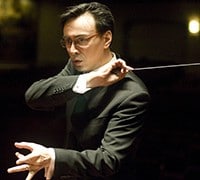
press release:
In his first subscription concerts as BSO Assistant Conductor, Ken-David Masur will lead the Boston Symphony Orchestra in a program of works by Berlioz, Saint-Saëns, and Rimsky-Korsakov, substituting at the last minute for Ossetian conductor Tugan Sokhiev who has had to withdraw from his BSO appearances due to illness; the flu and a sinus infection have prevented him from traveling to Boston this week.
Thursday, January 22, 8 p.m.
Friday, January 23, 1:30 p.m.
Saturday, January 24, 8 p.m.
Ken-David Masur, conductor
Johannes Moser, cello
BERLIOZ Le Corsaire Overture
SAINT-SAËNS Cello Concerto No. 1
RIMSKY-KORSAKOV Scheherazade
We heard earlier in the week that the chairman of English National Opera had sent a letter to his colleagues saying he wanted out. In a detailed analysis of the company’s structural and financial problems, Martyn Rose concluded that it would take more time than he could give to put the place to rights.
The Times has a slightly different version of events this morning. Maybe the chair just couldn’t be arsed.
Rose, a Conservative appointee, has been in the job less than two years. His predecessor, Peter Bazalgette, lasted just a few months before leaping off to the Arts Council where he imposed a swingeing $5 million cut on his former company.
What ENO needs in its present straits is a chairman of substance who believes in its artistic destiny, not a political muppet who is waiting for the next honours list.
Anyone know any white knights? The alternative could be dark nights at the Coli. UPDATE: New appointment here.

The coloratura soprano Siobhan Stagg has been summoned to rehearsal at a few hours’ notice to deputise at tomorrow’s Brahms German Requiem, and for the following two performances with Christian Thielemann.
She replaces Sybilla Rubens.
Siobhan has been winning hearts and minds at the Deutsche Oper Berlin, where she’s singing Pamina next month. Christa Ludwig has gone on record saying her voice is one of the loveliest she has heard.

The artistic director of the Palau de les Arts in Valencia has been set free on police bail.
Her passport has been confiscated and she will be called in for further questioning.
Helga Schmidt and her predecessor, Ernesto Moreno, are being investigated for misappropriation of funds at the art centre since it opened in 2005.
The judge is a prominent anti-corruption investigator.
So far, so legal and fit and proper.
But was it necessary to arrest a woman in her 70s at her hotel*, drive her to her workplace for five hours of evidence gathering and then subject her to daylong police interrogation?
The woman is artistic director of an opera house. She is an expert in casting operas, no more, no less. The money that passed through her hands was trivial compared to, say, anyone handling government defence or utility contracts. In a long career, she has never previously been accused of financial malfeasance.
The investigator in Valencia has taken a hammer to crack a peanut. It is possible that Helga’s human rights were breached. Without prejudicing the case in any way, one has to ask: was this an appropriate way to treat a lady of advanced years and impeccable character who has devoted her life to the arts and brought Valencia more opera than it has ever known?

*correction to earlier post
The era of grizzled old orchs is over. The Chicago Symphony has joined the new-grad trend by appointing Keith Buncke, 21, to a principal post.
He’s been snatched from the Atlanta Symph, where he’s in his first season as principal.
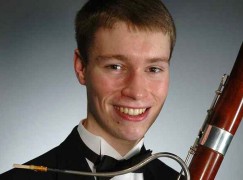
Sol3 Mio are coming on UK tour with a cast-iron guarantee: love the act, or your money back.

press release:
“If you are willing to buy the ticket, we are willing to put our hearts on our sleeves, put focus in our eyes, and put money where our mouths are. We guarantee that you will enjoy the show so much so that we will even give your money back if you do not break a laugh, tear or emotion. So come along and join us in the best night of song you will ever have!”
Trained at a prestigious opera school in Wales, the tenor brothers Pene and Amitai Pati and their baritone cousin Moses Mackay are hotly tipped as ones to watch among the next generation of opera singers to grace the stages of the world’s major opera houses. Pene recently won the highly-coveted Montserrat Caballé International Singing Competition. Together as Sol3 Mio, they not only bring their powerful voices to the public, but their infectious sense of humour through impeccable comic timing and brilliant off-the-cuff banter, reminding audiences of the lighter side of opera, and the traditions of ‘comic opera’ (opera buffa).

We have been given first sight of the poster for the coming picket of the Met’s January 26 production of Tchaikovsky’s Iolanta.

The organisers say:
NYC arts managements have turned a deaf ear and a blind eye as they continue to hire Russian artists who publicly parade their support for Putin’s wars, invasions, terrorism and his anti-gay policies. While the rest of the world condemns these despicable acts, Met Opera announced they “support” Anna Netrebko and are “proud” she sings at the Met. Ms. Netrebko had staged her so-called “donation” to the internationally wanted terrorist, Oleg Tsarov, via a mass media attempt to validate and endorse Putin’s invasions.
Another poster-child of the Met Opera, conductor Valery Gergiev was a signatory of the public letter of support for Putin’s military invasions in Ukraine. Mr. Gergiev continues to deny gays are persecuted in Russia, and he consistently defends Moscow’s bloody occupations of her peaceful neighbors, Georgia and Ukraine. Met Opera GM Peter Gelb responded with silence as did BAM and Carnegie Hall, where Gergiev also performs this month.
Why is this “speak no evil” policy of the Met, Carnegie Hall and BAM so objectionable?
Tens of thousands of human lives, wholesale destruction of cities and countrysides, hundreds of thousands of refugees – all sacrificed due to Russia’s needless colonial expansion. When we hire propaganda mouthpieces like Gergiev and Netrebko or buy tickets to hear these artists, we in effect support these terrorist activities.…New Yorkers are a civilized people. New Yorkers are not “proud” of Netrebko and Gergiev, nor do they “support” the killings of thousands of people. New Yorkers will not honor any performers who hide behind “tolerance” to propagate their own barbaric views.
The Moravian city of Brno, population 400,000, has a Beethoven-sized philharmonic orchestra and a very good concert hall. If it wants to do the ninth symphony or anything larger, it has to use the opera house, which is named after the city’s most important musician, Leos Janacek.
The Janacek Theatre, somewhat showing its age, is perfectly serviceable for opera, but the acoustics are not right for concerts.

Today the city told the Brno Philharmonic Orchestra that it can have the funding needed to build a new hall, probably some £27 million. Mikel Toms, who conducts there a lot, is thrilled.
London (population 8 million), on the other hand…. oh, don’t go there.
It didn’t come overnight. It was a seven-year campaign, reaching out to 6,648 donors, 4,558 of them first-timers.
But now the last pledges are in Houston Grand Opera has announced it overshot its $165 million target by almost 10 percent.
That’s some fund-raiser.

Helga Schmidt has been suspended as general director of the Palau de les Arts in Valencia, Spain, amid reports of financial irregularities. The Spanish news agency says there have been two arrests. One is said to be a past director, Ernesto Moreno.
Helga Schmidt has built a reputation on hiring expensive artists at presumably cut-price rates. She was due to retire in 2016.

UPDATE: The latest reports say Helga has been arrested.
Her official biography:
Helga Schmidt (Vienna, 1941) has been one of the most influential public figures in the world of music over the past fifty years. Born into an environment with deep roots in music -her father was Studienleiter of Wilhelm Furtwängler and she grew up immersed in the musical environment of Vienna during the second half of the 20th century-, her comprehensive musical training began when she was just a child. She studied piano in Vienna and then went on to study History of Art at the Sorbonne in Paris.
Thanks to her father, she regularly came into contact with public figures such as Karl Böhm, Dimitri Mitropoulos, Clemens Krauss or even Furtwängler himself, in addition to other great singers who frequented the Vienna Opera House at that time. Later, she came into contact and worked with maestros such as Georg Solti or Carlos Kleiber.
Her professional career began as assistant to the general director of the Vienna Festival, Egon Hilbert, when she was only 21 years of age. In 1962, she actively participated in the staging of Lulu by Alban Berg, and conducted by Karl Böhm. These were the first performances of the Berg opera during the postwar period. Together with Karl Böhm she also promoted a new staging of Daphne by Richard Strauss, with Fritz Wunderlich as the lead.
Two years later, in 1963, Hilbert was appointed manager of the Vienna Opera House, and Herbert von Karajan was artistic and musical director. Both men took on Helga Schmidt to work for this opera house where she continued to work side by side with Karajan for ten years. “I owe my career to him”, recalls Schmidt, adding: “It was Karajan who advised me to go into artistic management, beginning from the bottom and getting to know the nooks and crannies of the theatre. He was a very demanding man, most profound and a restorer. For him, the top priority of the opera was the music and the stage was simply limited to accompany it. He was very meticulous and he supervised absolutely everything. And, in this sense, I have followed closely in his footsteps”. A strong supporter of the best Italian singers, her wholehearted support helped imperial artists such as Giulietta Simionato, Mirella Freni, Alfredo Kraus, Franco Corelli, Giuseppe di Stefano, Boris Christoff, Cesare Siepi, Tito Gobbi, Piero Cappuccilli and even her own husband the baritone singer Wladimiro Ganzarolli, to triumph in Vienna. She was also responsible for the performances of two universal dancers, Margot Fonteyn and Rudolf Nureyev, at the Vienna Opera House.
From Vienna she moved to London, where she was the artistic director of Covent Garden during the 1970s. She was only 33 years old and was the first woman to hold a post that had been only held by men. Together with Colin Davis, she was in charge of one of the most outstanding periods of the London theatre. Thanks to Helga Schmidt, the Royal Opera House witnessed the debut of conductors such as Karl Böhm, Riccardo Chailly, Christoph von Dohnányi, Bernard Haitink, Carlos Kleiber, Lorin Maazel, Zubin Mehta, Riccardo Muti, Seiji Ozawa and Georges Prêtre, in addition to the debut of the singers Jaume Aragall, Montserrat Caballé, José Carreras, Plácido Domingo, Birgit Nilsson, Luciano Pavarotti, Ruggero Raimondi and Joan Sutherland, to name just a few. She also promoted countless recordings on vinyl that have now become an indispensable reference for the world of records. Amongst these is the famous recording of Tosca in 1976, conducted by Colin Davis and with Caballé, Carreras and Wixell in the leading roles.
The artistic adviser for countless institutions and orchestras of high standing (including the Concertgebouw of Amsterdam and the Royal Symphony Orchestra of London), towards the end of the 1990s, Helga Schmidt was fascinated by the ambitious project that was being developed by the Generalitat Valenciana (the regional government) and the architect Santiago Calatrava. Their idea was to open an opera house in Valencia. The avant-garde architecture of the new building and the wholehearted support of the regional government persuaded her to become directly involved in the project.
And since the year 2000, she has worked full-time on this project. The opera house was inaugurated in 2005 as the “Palau de les Arts Reina Sofía”, and over the past seven years Helga Schmidt has succeeded in placing this new musical centre up amongst the best and most reputable on the international scene. It has been the latest achievement of this exemplary manageress who, in her non-existent free time, dreams of rereading Rilke, Goethe or Baltasar Gracián, “who was such a great influence on Schopenhauer”. She also dreams of living with her two dogs in her country house in Piedmont and sailing alone “upon a blue sea of infinite horizons with just the indelible memory of my husband Wladimiro for company”. In June 2012, the president of Austria awarded her the Cross of Honour for Science and Art, First Class, the highest award that can be obtained in the Republic of Austria.
Chicago pianist Lori Kaufman, rebased after a period in Asia, is keeping a close eye on her home town music scene. In her first report for Slipped Disc, Lori wonders why the Symphony audience is so…. advanced in age. She makes an important point. Let’s hear your views.
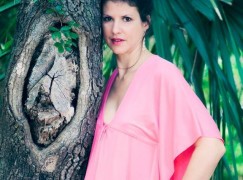
photo: Amy Gelb
Classical music isn’t dead! It’s just too expensive.
Last week, Chicagoans were able to hear Tchaikovsky’s first symphony played live by not one but two exemplary ensembles, the youthful Civic Orchestra of Chicago and its benevolent sugar daddy, the Chicago Symphony Orchestra.
While both halls were close to 99% full, the demographic was shockingly different. One audience was much older than the other. Why? The Civic show, accompanied by pop culture superstar Yo Yo Ma was free, while the CSO charged $70 to over $200 for seats. Sound the trumpets, Classical music isn’t dead! It’s just too expensive.
Monday night, Lane Technical High School hosted an exuberant overflow of high school students of a wide range of ethnicities, but also young children, parents, multi-generational families, excited band students and their friends, teachers, school staff members, and even one mother who listened just outside the doors with her toddler so the music could caress the brainwaves of her developing child.
The energy in the hall was electric. I was sitting next to a woman with her two daughters, the oldest was seven and was excitedly scanning the musicians warming up onstage trying to locate the esteemed soloist. “Mommy, is THAT Yo-Yo Ma? In the purple sweater? Where IS he? When is he coming out??” I asked the young music lover if she has ever heard Mr Ma play in a concert, and she said “No, but my mom has a recording of him.” Glancing around, the rest of the lucky ticket holders seemed just as charged up watching the young musicians surfing their fingerboards onstage. I can’t remember attending a concert where there was such a buzz of anticipation in the hall.
The Lane Tech showing proved that there are a lot of Chicagoans who would leap for a chance to hear world class music played live. Indeed, we were treated to a thrilling evening of wall-to-wall Tchaikovsky, interspersed with words of wisdom from miked-up Ma and charismatic boy-next-door conductor Scott Speck. Maestro Speck recently endeared himself to Chicago Tchaikovsky lovers by showing off in a much-lauded Nutcracker run at the Joffrey Ballet, where the musicians of the orchestra almost stole the limelight by playing every bit as gracefully as the dancers.
Tchaikovsky’s first Symphony is a perfect ideological fit for this group of talented young people, Civic Orchestra is a virtuoso “training” orchestra, with players who will soon be principals in the world’s top ensembles. Everyone onstage delighted in the spontaneity and whimsy of the young Tchaikovsky. Maestro Speck wanted to take us on a sleigh ride through a wintry Russian landscape, and though high school auditoriums are notoriously overheated, he recreated the imagery perfectly. Next, Mr Ma left the cello section and went up to the front for one of his signature concerti, the Rococo Variations. Here, the orchestra members responded with cheekiness and enthusiasm to every coy gesture of Mr Ma, making the concerto more like an affectionate foray into chamber music. Naturally, the ovations were stunning, and the attendees were blessed with a superbly delivered 6th Symphony after the break.
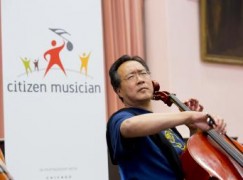
Later in the week, downtown at Symphony Hall, the audience entered in a more staid manner. They were largely of a certain, rather distinguished age group, and no children to be seen. One of the youngest members of the audience might have been 18 year old Kathleen Mills, a freshman at the Unversity of Chicago. “I was so fortunate to be able to attend the concert on Thursday. For the Muti and Bronfman concert, I paid $15 for a (student-priced) ticket that would have otherwise cost me five or ten times the price. I also think that people my age would enjoy classical music with more exposure.” While the CSO generously provides such affordable tickets for students, how many college and high school students actually know about this boon or take advantage of it? And what about families who cannot afford multiple high priced tickets?
On Thursday night, the CSO “warmed up” by playing the Brahms second piano concerto with powerhouse soloist Yefim Bronfman. Riccardo Muti’s direction was, quite simply, a masterclass in how to accompany a soloist. He parsed through the score assigning everyone’s role a particulate timbre, volume, and character. The balance was so astonishingly perfect that the musicians allowed Bronfman to alternate between a colossal Incredible Hulk and gentle David Banner, every single note carrying like a carrier pigeon straight into the audience, whether a finely woven texture of pianissimo or the most trenchant fortissimo-plus.
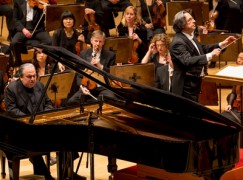
photo: Todd Rosenberg/ChicagoOnTheAisle.com
After the intermission, Muti brought us a wholly different Tchaikovsky than the one we heard four days earlier. Where Civic played the First Symphony like an amuse-bouche, the CSO gnawed into it like a Porterhouse steak. Here we saw the grandeur and tortured pain of this symphonic work, the depth and breadth and anguish of a troubled composer washed over us like tumultuous waves. Here we saw even more of the orchestra’s precision and commitment, yet also their delight (and frequent smiles) in every gesture of their Director.
While violin bows danced up and down in perfect synchronization, Muti knew just how to highlight the gifted members of each wind section, in particular, four horns whose timbre so completely melded to each other that it sounded like one person breathing into a turbo-charged horn. In our digital age of striving for perfection, this is it, folks, perfection on a plate. You can’t get this from listening to itunes, you must see it up close, 100 artists putting their hearts and brains together to create a flawless work of art. Certainly, they earn their salary every night. The CSO is currently running on a $60 million budget and they need every cent of that to keep to such a dizzyingly high artistic standard. But how can we get more people inside to experience what they have to offer?
YoYo Ma said from the stage Monday night: “You can’t think about self-doubt when you are onstage showing someone how absolutely passionate you are about this thing you are doing, this thing that you think is just so completely amazing that you must share it with the world.” I know that Maestro Muti is committed to bringing great music to EVERYONE in the community, not just those who can afford it. How can we help to accomplish this? And to keep more US orchestras in business with a vibrant operating budget? What is the answer? I don’t know. But I sure would like to tell it to that seven year old girl sitting next to me earlier last week.














